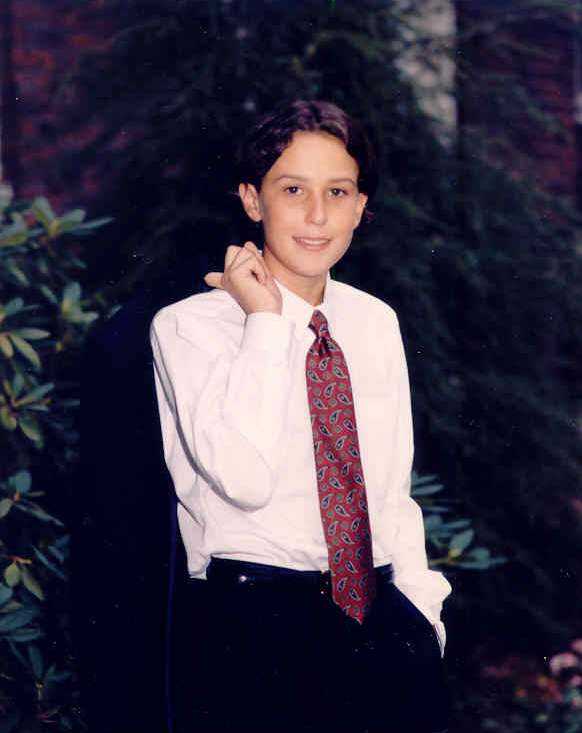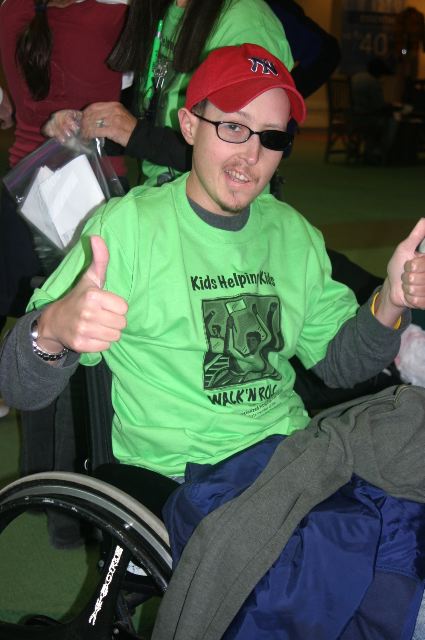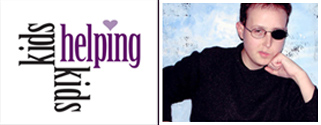
Mischa's Story
In Memory of Mischa
Our Founder, Our Friend, Our Rock
August 18, 1982 – February 1, 2005
Mischa Zimmermann’s life broke apart at age 13. He was a
beautiful boy, a great athlete and student, a popular kid with
nothing but clear sky above him.
Then came the symptoms – in his case vomiting and weight loss – eventually the diagnosis: a tumor that had penetrated his brain stem. His mother, Heni, had been diagnosed with cancer six months earlier and Mischa’s illness sent his family into a deepening crisis. “My own mother was a Holocaust survivor,” Heni recounts, and “so I grew up with stories of the camps, the helplessness and the terror. When this happened to Mischa, I understood how it must have been in the camps. It felt like someone had a gun to my head day and night.”
Mischa had his first surgery in a hospital in New Jersey. For almost
six months following surgery he remained imprisoned in what’s called a “locked-in” state. He was awake and aware of the world around him, but he was totally paralyzed and incapable of communicating. At first he couldn’t move a muscle. Then he could Mischa, age 13
move one foot and signal yes or no with it, in response to questions.
A few months later, he could use his hands and spell out words on a letter-board. It was almost a year before he could begin to speak or to swallow food.
During his long locked-in months, Mischa believed that he was dead and that the limbo state he existed in was some kind of eerie afterworld. He could still see the world of the living going on around him, but he couldn’t touch it or speak to it. “I remember seeing snow out the window thinking, it must be winter in the
living world, " he recounts now.

“It wasn’t until months later, when I started to come out of it, that I realized I was still alive.” While Mischa was still recuperating, a five-year old boy down the hall asked Mischa if he could borrow Toy Story. Mischa gave the tape to the boy as a gift. He still marvels at how this tiny event turned the boy around. “I couldn’t believe how much something as small as a videotape meant to this kid. He hadn’t smiled in a week, and here he was grinning and laughing out loud. I also realized how good it made me feel to do something for another kid. It made me feel more alive and less involved in my own problems. That’s when I first had the idea for Kids Helping Kids.”
While Mischa continued to fight to regain his health, he teamed up with his mother to launch Kids Helping Kids, a volunteer organization run by teens to benefit teens who are facing medical crises. The name of the group says it all- kids helping kids in whatever way they can: raising money to buy motorized wheelchairs, donating time to keep a lonely kid company in the hospital, pooling resources to grant a sick child a special wish.
Mischa began Kids Helping Kids by recruiting forty of his classmates at Montclair High School. He envisioned growing this grass-roots program into a national network of young volunteers. “It’s all about kids reaching out to each other,” is how Mischa describes the group’s mission. “I know from personal experience that no one can erase a kid’s loneliness and sadness
like another kid.”
Mischa never set out to make his mark as an advocate or an activist. “Like everyone else, I just wanted to have a normal life, to be like other kids and fit in rather than stand out. But when you’re in a wheelchair with a patch over one eye and your voice is messed up, it’s impossible to blend in. So you get over it. You get over your inhibitions and your fears. There’s not much that scares me now.”
About the only thing that does scare Mischa, “a lot more than dying,” he says, is the prospect of losing his independence. He attends New York University. He lives in a dormitory, takes care of himself, and navigates the streets of Greenwich Village in a motorized scooter. “When I’m asleep, I often dream that I’m not in a wheelchair. I’m normal, my old self. Then I wake up and I have to come to grips with what’s really going on in my life. I have to make today count.”
Mischa keeps his emotional center of gravity by remembering the kids who need help more than he does. “When I was in the hospital and still locked-in, there was a point where I wanted to blow my brains out. I figured that if I killed myself, I would move on from this limbo state to another world. Now suicide isn’t in the picture. Even though a lot of things in my life suck, I can do things that other kids can’t. A lot of people are worse off than me – and I can work to make their live better.”
During the months when he was still partially locked-in, Mischa used to watch videos – the same dozen movies over and over again. “The movie that really got me through that period was The Shawshank Redemption,” he remembers. “I literally watched that movie fifty or sixty times. Tim Robbins plays this guy whose wife is murdered. He’s wrongfully accused of killing her and is thrown into one of those hellish maximum-security prisons. He has his whole life taken away from him; he has to subsist on hope – that’s all he has. After twenty years in prison he finally escapes to freedom. I’ve always identified with that character. Like him, I keep hanging in there, trying to make a happy ending for my life, and for other people’s lives.”
I’ve played only a small part in Mischa’s medical treatment, but he’s taught me volumes about the potential for making one’s personal redemption a blessing to others. Children have an instinct for redemption. They can find it in the most unlikely places. Even when their suffering is beyond our imagination, they can find a lifeline – even if they’re locked inside a body with no companionship other than a stack of old videos.
Mischa understands that it’s not what you feel that counts; it’s what you do about it. He doesn’t buy into the culture of T-shirt slogans and bumper sticker ideologies that frame the world as a cosmic joke. “Shit Happens.” True enough, but it’s how you behave in a shit-storm that shows what you’re made of. “Commit Random Acts of Kindness.” There’s nothing random about acts of kindness. Compassion is an active verb with moral consequences.
When Mischa Zimmermann pulls himself out of his wheelchair to exhort a room full of high school students to open their hearts and donate their time and energy to helping other kids, he raises up everyone in the room. When he wheels into a hospital, to give a bedridden little girl a new tricycle and a few words of encouragement, it’s not a random act of kindness. It’s a courageous and willful act of compassion that multiplies the good in the world – and helps heal a shattered life.
Excerpted from “If I Get To Five” by Fred Epstein, M.D.
Fred Epstein, M.D., was the founding director of the Institute for Neurology and Neurosurgery (INN) at Beth Israel Hospital in New York City. His groundbreaking surgical techniques and his commitment to humane patient care saved thousands of children’s lives and earned him a reputation as one of the world’s leading pediatric neurosurgeons. Sadly, Dr. Epstein sustained severe neurological damage that left him partially paralyzed a bicycle accident in 2001. He died in July, 2006 of a malignant melanoma.
DONATIONS IN MISCHA’S MEMORY CAN BE MADE HERE
We are grateful for your thoughts and know that Mischa’s courage
and compassion lives in all our hearts.
We will carry on his mission with pride until all the forgotten kids are
able to leave their rooms and rejoin the world.
Mischa, you will never be forgotten, you are heartbreakingly missed.
Kids Helping Kids, Inc. (KHK) has taken all reasonable care in the preparation of this website to ensure that the information contained herein is responsible. However, no warranty or representation is given that the information and materials contained herein are free from errors or inaccuracies. To the extent permitted by applicable laws, KHK accepts no liability for any direct, indirect or consequential damages however caused resulting from the access to and use of this brochure and the suggestions contained in it. This exclusion of liability shall not apply to damages arising from death or person injury caused by the negligence of KHK or any of its employees or agents. KHK is providing these suggestions to you only as a convenience. This disclaimer is governed by the laws of the United States. If any provision of the foregoing is held to be unlawful, void or for any reason unenforceable, then that provision shall be deemed severable and shall not affect the validity and enforceability of the remaining provisions.
© 2022 Kids Helping Kids Inc. is a non-profit 501 (c) 3 organization. All Rights Reserved


